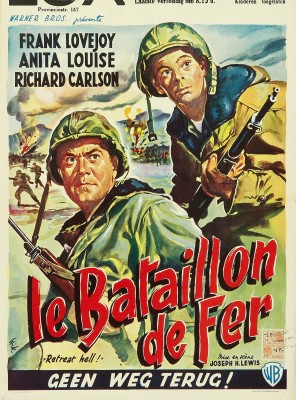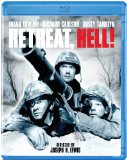| Reviews & Columns |
|
Reviews DVD TV on DVD Blu-ray 4K UHD International DVDs In Theaters Reviews by Studio Video Games Features Collector Series DVDs Easter Egg Database Interviews DVD Talk Radio Feature Articles Columns Anime Talk DVD Savant Horror DVDs The M.O.D. Squad Art House HD Talk Silent DVD
|
DVD Talk Forum |
|
|
| Resources |
|
DVD Price Search Customer Service #'s RCE Info Links |
|
Columns
|
|
|
Retreat, Hell!
Today, however, and especially with Olive Films making Retreat, Hell! more accessible via this new high-def transfer, this indie from Milton Sperling's United States Pictures, originally released by Warner Bros. but now part of the Paramount library, is being reassessed as a better film than it outwardly seems. The picture is much more in the tradition of William Wellman's Battleground (1948), the groundbreaking MGM production that ushered in a different kind of war movie, at least one rarely seen since Lewis Milestone's adaptation of All Quiet on the Western Front at the dawn of talkies. The tone of the film, particularly in terms of a character arc sensitively enacted by Russ Tamblyn, anticipates Samuel Fuller's autobiographical, late-career masterpiece The Big Red One (1980). Retreat, Hell! isn't quite up to the level of any of those films, but it's much better than previously believed and definitely worth a look.
Perhaps coming to Olive in such a roundabout manner, i.e., a Warner release whose rights (if I get this right) first transferred to Republic then Mélange then Viacom then Paramount and now sublicensed to Olive, the film elements are in okay but not great shape. Clouding matters further is director Joseph H. Lewis frequent use of dissolves and late-in-the-game optical printing (because he didn't shoot enough coverage?) and the use of scratched-to-hell military stock footage. Nevertheless, overall the image is pretty good and its flaws don't take the viewer out of the film.
The Korean War began in June 1950 and Retreat, Hell! premiered in February 1952, suggesting this was shot no later than the summer of 1951, when the war was in full swing. The story begins just as the war breaks out, when US Marine reservist Paul Hansen (Richard Carlson), a veteran from the last war, arrives at Camp Pendleton with his wife (Anita Louise) and two kids, ready to make the best of a bad situation. But no-nonsense Lt. Col. Steve Corbett (Frank Lovejoy) has a driving sense of urgency that makes no allowances for families, personal matters, or anything else. Hansen, who became an electronics expert in civilian life, instead is put in charge of a company of young recruits Corbett expects to be combat-ready in a matter of weeks.
Exemplifying the young recruits is Jimmy McDermid (Russ Tamblyn), whose older brother, already serving in Korea, father, and other relatives all served in the Corps. Jimmy can't wait to prove his mettle, but chokes under fire then spends the rest of the picture trying to overcome his understandable fears and regain his footing.
Amusingly, the cast is composed of actors who would later have prominent careers behind the camera. Richard Carlson, on the cusp of starry-eyed sci-fi stardom (It Came from Outer Space, Creature from the Black Lagoon, etc.) and whose sensitive acting serves him well here, soon became a prolific director of television shows and, occasionally, movies, often Westerns or sci-fi & horror in nature. Nedrick Young, as Carlson's trusty sergeant, was soon blacklisted but turned to screenwriting under various pseudonyms (often Nathan Douglas), writing or co-writing screenplays to Jailhouse Rock (1957), The Defiant Ones (1958), Inherit the Wind (1960), and The Train (1964), among others. And Lamont Johnson, as Capt. "Tink" O'Grady, Hansen's across-the-street neighbor at Camp Pendleton, was primarily a highly-regarded director of television films.
In addition to providing the crew with access to Camp Pendleton for filming, the USMC also helped construct the barren, snow-dusted landscapes (substituting gypsum) and built some of the supposedly Korean structures seen in the film, though much of it looks like redressed studio backlot streets more western than Asian in appearance. But Retreat, Hell! is impressively grim nonetheless. Any imagined glamor of war instantly evaporates the moment Hansen's men make their amphibious landing. Scrambling up a ladder, the man ahead of Tamblyn is shot dead and his lifeless body falls on top of him, startling the green private.
More than that, the movie is devoid of any sentiment or comedy relief whatsoever. There's no blustery/charming Ward Bond or Victor McLaglen around to calm and rally the frightened troops with their bravado and corny anecdotes. Hansen and Tink have a last night double date with their wives before shipping out, but it's not a pleasant evening with its undercurrent of tense unhappiness. Once in Korea, everyone is realistically worried they might not make it back alive. (Note the expressions on the poster above.) Though far more realistic than most World War II movies made during that war, reportedly Retreat, Hell! actually boosted rather than deterred enlistment. The USMC knew what they were doing in supporting its production, apparently.
And, another plus, not once is there any talk of politics, of the Commie menace, of the Red Chinese whose Zulu-like masses constantly threaten to overrun the under-supported Marines. In short, Retreat, Hell!, despite its silly title and repeated use of the Marines' Hymn ("From the halls of Montezuma …") this is not the picture one might expect.
Video & Audio
In its correct, original 1.37:1 format, Retreat, Hell! looks reasonably good, considering. It's not on the same plane as, say, Olive's Republic releases, which appear culled from better film elements, but it's okay nonetheless, despite reservations noted above. The DTS-HD Master Audio, in its original mono, English only with no subtitle options, is also excellent. No Extra Features.
Parting Thoughts
Very good through and through, Retreat, Hell! is a mini-discovery well worth seeking out and Highly Recommended.
Stuart Galbraith IV is a Kyoto-based film historian whose work includes film history books, DVD and Blu-ray audio commentaries and special features. Visit Stuart's Cine Blogarama here.
|
| Popular Reviews |
| Sponsored Links |
|
|
| Sponsored Links |
|
|
| Release List | Reviews | Shop | Newsletter | Forum | DVD Giveaways | Blu-Ray | Advertise |
|
Copyright 2024 DVDTalk.com All Rights Reserved. Legal Info, Privacy Policy, Terms of Use,
Manage Preferences,
Your Privacy Choices | |||||||














